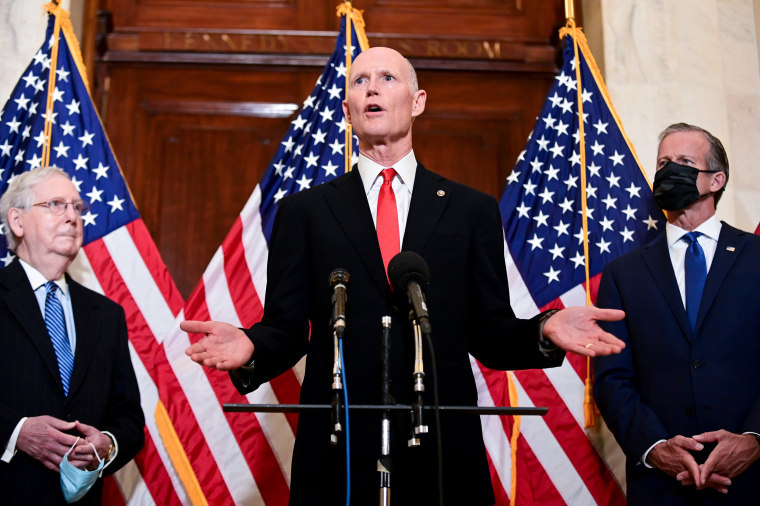There's no great mystery as to why Donald Trump and his allies are attacking their own country's electoral system. The Republican president obviously lost his re-election bid, which led him to launch an offensive against the United States' democracy -- because any election in which he lost must be "rigged," and any system that tells him what he doesn't want to hear is corrupt.
The effects of such an assault will likely be felt for quite a while. For example, the GOP's lies about the integrity of the nation's electoral system are corrosive and undermine public confidence without cause. What's more, the lies appear designed to undermine the legitimacy of the incoming Biden administration, despite the fact that the president-elect won by a margin Team Trump considers a "landslide."
But just as important are some of the policy measures Republicans are envisioning to address the problem that doesn't exist. Sen. Rick Scott (R-Fla.) published this tweet last week:
"This election has shown we need major reforms to our election systems, including Voter ID laws across the nation, to protect against fraud and rebuild the American people's trust in fair outcomes."
Over the holiday weekend, Rep. Dan Crenshaw (R-Texas) published a Twitter thread along the same lines:
"The 2020 election chaos is embarrassing [and] must be fixed. Election integrity must be a priority at every level of [government] moving forward. The integrity of elections must be self-evident, an airtight process that withstands scrutiny, where no one can plausibly question results."
The Texas Republican proceeded to push for, among other things, new restrictions, including voter-ID requirements and new limits on mail-in voting.
The circular reasoning is amazing:
1. Leading Republicans respond to an election defeat by lying about the integrity of the system.
2. Much of the country, incredulous about election results they don't like, believe the lies.
3. Leading Republicans exploit the confusion to call for new voting restrictions, which in turn would help Republican candidates.
Look at those quotes again. Rick Scott believes the 2020 elections prove "we need major reforms to our election systems." But why? What was wrong with the administration of the 2020 elections? The Florida Republican says it's time to "rebuild the American people's trust in fair outcomes," but it's his party that's undermined the American people's trust with baseless and unsubstantiated claims.
Likewise, Dan Crenshaw believes the 2020 cycle has been "embarrassing." Perhaps so. But the embarrassment has been a series of deliberate GOP decisions that deliberately created an unnecessary mess.
The Texas Republican added, "The integrity of elections must be self-evident, an airtight process that withstands scrutiny, where no one can plausibly question results." But how is that different from the status quo? In reality, no one can plausibly question the results of Biden's victory, but Trump and his allies clearly couldn't care less about what is or isn't plausible.
Republicans, in other words, are trying to both manufacture and address made-up concerns.
To be sure, this is not to say the existing system is perfect. There are a series of worthwhile civic reforms -- creating automatic voter registration, ending partisan gerrymandering, expanding voting rights, making Election Day a national holiday, et al. -- that would make a positive difference.
But the bottom line remains the same: there's no defense for Republicans generating unnecessary questions and then answering them with unnecessary measures designed to help Republicans win more elections.

